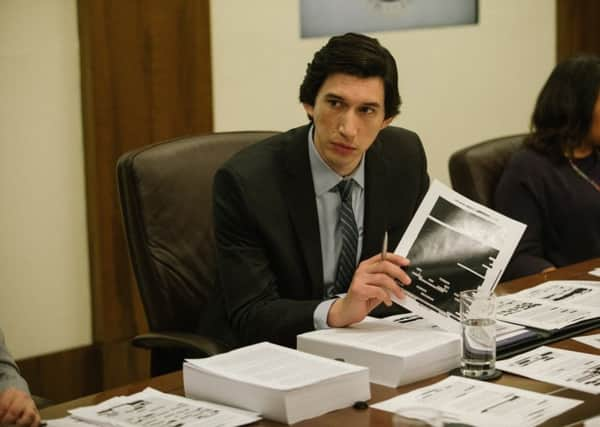Film reviews: The Report | Marriage Story | Le Mans ’66 | Little Monsters


There’s a great moment late on in The Report, Scott Z Burns’s fact-based drama about Senate staffer Dan Jones’s epic investigation into the effectiveness of the “Enhanced Interrogation Techniques” the CIA deployed in the aftermath of 9/11. It involves Jones (played by Adam Driver) dejectedly watching a TV spot for Kathryn Bigelow’s Zero Dark Thirty, a film that was (erroneously) castigated in some quarters for validating the link between the CIA’s use of torture and the acquisition of information leading to successful attack on Osama bin Laden.
Like the scene in Zodiac when Mark Ruffalo’s character points to a poster for Dirty Harry and complains that they’re already making movies about his case, Burns’s inclusion of this scene isn’t so much a critique or attack on Bigelow’s film as it is an acknowledgement of the sometimes unwitting power movies have to shape our understanding of real world stories, especially when the details of those stories are still emerging. It’s an understanding that shapes Burns’s own uncompromising approach to The Report, a paper-trail procedural that strips away extraneous details to better reflect its subject’s absolute dedication to the job his boss, Democratic Senator Dianne Feinstein (Annette Bening) assigns him.
Advertisement
Hide AdJumping back-and-forth in the historical timeline, the film cuts between Jones’s Kafka-esque existence as he conducts his years-long, document-devouring investigation from his bunker-like Washington office, and scenes depicting the brutal transformation of intelligence services field work following the Bush-Cheney administration’s determination to circumvent the Geneva conventions through its use of “black sites” and the sort of Orwellian linguistic jujitsu required to provide a legal defence of the indefensible. Like the Feinstein-McCain Anti-Torture Amendment that Jones’s report eventually led to, however, the film is also rigorously non-partisan; Burns has no problem exposing the failure of the Obama administration to make the report’s findings available. The end result is dense, but quietly thrilling filmmaking, with Driver’s laser-focused performance brilliant at modulating Jones’s mounting frustration and disgust at this bureaucratic assault on democracy.
Driver pops up again as one of the co-leads of Noah Baumbach’s Marriage Story, a very raw and sometimes very funny portrait of a couple negotiating the trauma of divorce. Like a love story in reverse, the film kicks off with a montage of scenes from the happy seeming marriage of acclaimed New York theatre director Charlie (Driver) and his LA-raised actress wife Nicole (Scarlett Johansson). Complimented by offscreen monologues, each montage corresponds to a positive memory one has of the other – but this mutual paean to their relationship’s best days is quickly revealed to be part of a mediation exercise designed to encourage civility for the sake of their young son as they prepare to divorce.
That rug-pull sets the scene for what follows as egos and frayed nerves sabotage the couple’s naively optimistic desire to separate without the emotional and financial toll that comes from doing everything through over-priced lawyers. Given Baumbach’s habit of drawing from his own life, the film certainly carries potentially prurient parallels to his own divorce from actress Jennifer Jason Leigh. But where the film really triumphs is in the space it gives both Johansson’s and Driver’s characters to show not just how something that once seemed so great can easily sour, but how it can also, with time, transform into something else that re-frames what love between two ultimately mismatched people can mean. That said, the sustained ten-minute argument that forms the dramatic high-point of the film is a proper showstopper.
A one time project for Michael Mann, Le Mans ’66 – a dramatisation of the Ford Motor Company’s determination to end Ferrari’s dominance of the titular 24-hour race – arrives courtesy of James Mangold and the results are as conventional as one might expect from the director of a populist Oscar-winner like Walk the Line. Delivering broad – albeit broadly entertaining – movie-star performances, Matt Damon and Christian Bale barely scratch the surface of their respective characters: ex-racing-driver-turned-car-designer Carroll Shelby and Shelby’s temperamental Brummie engineer Ken Miles. But they do enough to keep the film chugging along as it delves into their battle with the suits at Ford who hire them to develop a car that will challenge the artisanal perfection of their European rivals. Though given the more streamlined (and less foreign-language sounding) title Ford v Ferrari in the US, the film doesn’t seem all that interested in the Ferrari part of the story, relegating it to the numerous petrolhead-juicing race scenes. Instead it’s content to serve up another inspirational tale of visionary mavericks battling their money-orientated corporate overlords. The film itself seems blissfully unaware of its own production-line blandness. Outlander’s Catriona Balfe co-stars.
The zombie film gets another tiresome revival in alleged comedy Little Monsters, a laugh-free Australian effort that plays like a cross between Shaun of the Dead and Kindergarten Cop. As a nursery teacher forced to defend her young pupils from the undead while on a class outing, Us star (and Oscar-winner) Lupita Nyong’o is wasted playing second fiddle to Alexander England, cast here as the boorish man-child uncle of one of her pupils. Josh Gad (Frozen), meanwhile, pops up in a desperately unfunny supporting role as a lascivious children’s entertainer, which is symptomatic of the film’s belief that juxtaposing crude adult humour with cute five-year-olds being adorable is inherently funny. It’s not. ■